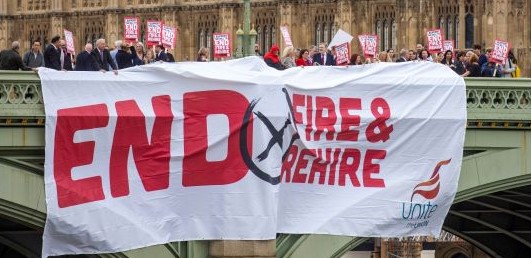â€Abdication of responsibility’
Squabbling Tories have no Brexit plan and are risking catastrophe for Britain, Len McCluskey told TUC delegates yesterday (September 10).
Speaking at congress’ annual conference in Brighton, the Unite leader condemned the Conservative’s failure to put national interests in front of their own.
His speech came after Unite freedom of information (FoI) requests to multiple government departments exposed the government’s lack of a strategy for the economy once the UK leaves the EU, with responses suggesting industry is being left to get on with it alone.
â€Divided, reckless government’
Addressing congress, McCluskey said, “This is a divided, reckless government, without plan or purpose beyond its own survival and is driving Britain and many of our key industries straight towards the precipice placing tens of thousands of jobs in jeopardy.
“And here’s the real problem, colleagues, much of the Tory party just doesn’t care.
“It’s all collateral damage as far as they’re concerned, on the highway to their low-wage, low-tax utopia, a second Singapore floating off Europe, undercutting wages and social protections.”
McCluskey warned the country “cannot afford a Tory Brexit” and told the unions gathered that “only unremitting pressure from the labour movement is going to avert this catastrophe.”
He reminded delegates that Theresa May’s promises to protect workers’ rights through the EU withdrawal bill – which faces a vote on its second reading tonight (September 11) – were as empty as her vows not to hold a general election.
“Theresa May says it’s not her intention to do that but calling an early general election wasn’t her intention either – until it suited,” McCluskey said.
“She regrets that decision now, and let me make it clear – if she uses Brexit as a pretext to attack workers’ rights, she will live to regret that too.”
Opposing withdrawal bill
McCluskey said Unite supports Labour “in opposing the Tories’ EU withdrawal bill, which will give ministers powers to scrap workers’ rights as and when the fancy takes them.”
He also reiterated Unite’s support of Labour’s plan for a transition period once the Article 50 negotiations have finished in March 2019, saying it would avoid “crashing out of the EU without a plan, by remaining within the single market for a short additional period”.
The government’s lack of a Brexit plan was thrown into stark relief, after research by Unite released to coincide with the TUC Brexit debate, revealed the government is failing to work with and direct key industries in overcoming the highly complex challenges involved in leaving the EU.
The union asked a series of FoI questions to four different government departments, concerning the following sectors: construction, food processing, agriculture, aerospace, chemicals, manufacturing, higher education and finance.
Migrant workers
All of these sectors contain a significant number of European migrant workers. Unite asked “what assessment or estimate has been made of how many non-UK workers are currently required?” and “what assessment or estimate has been made of how many non-UK workers will be required for the first five years after the UK exits the European Union?”
None of the departments were able to answer the questions.
The department for business, energy & industrial strategy (BEIS) which is responsible for the aerospace, chemicals, construction and manufacturing sectors stated: “Industry is best placed to estimate its future skills needs.”
Unite also asked the department of BEIS and the treasury how many â€letters of assurance’ relating to Brexit have been issued in the aerospace, automotive, chemicals and finance sectors. Both departments replied that they do not hold such information.
Commenting on the findings, McCluskey said, “The idea that industry is best placed to estimate and tackle its future skills needs is not tenable. Business’s priority is not the national interest but profits and shareholders’ return.
“Brexit is the most complex political issue that the UK has had to contend with in the last 50 years. That is why the government must be providing direction and clarity on the sort of economy and country we seek to be. The present hands-off approach, however, is far from a plan; it’s an abdication of responsibility.”
 Like
Like Follow
Follow


